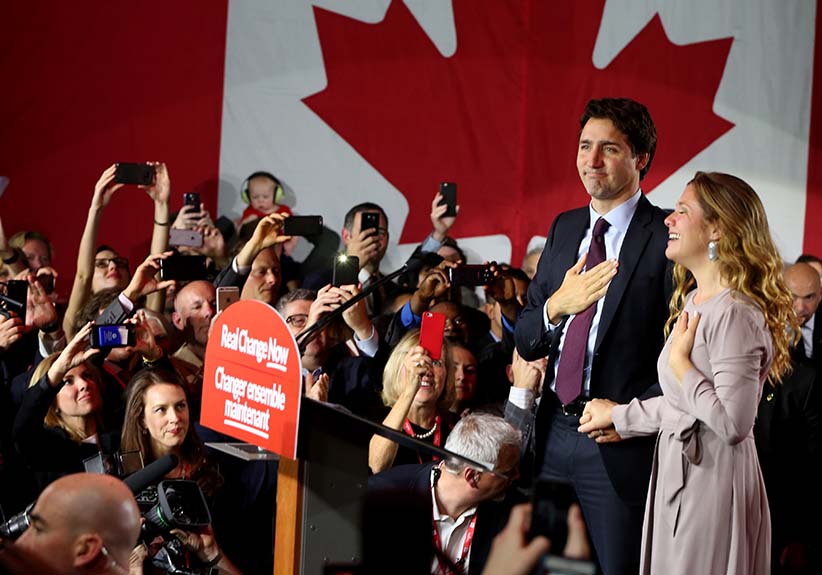Scott Feschuk recaps the three speeches from election night
Three leaders with no regrets at all spoke about their campaigns after it was all over. And it was almost as if two of them didn’t lose.
Share

Justin Trudeau’s speech on election night was the oratorical equivalent of a 1980s K-tel album: nothing but the hits. “Sunny ways”—a Laurier quote. “Better angels of our nature”—Lincoln. He offered up the best lines from his stump speech . . . but wait, there’s more! Order now and he’ll throw in some bonus humility! “I am not the one who made history tonight. You did,” Trudeau said. Cool, I’ll be in the sauna at 24 Sussex.
Was his speech a little long? Sure. He probably didn’t need to say the same thing in quite so many ways: Hope triumphs over fear, confidence beats pessimism, good is gooder than bad, etc. But the outgoing administration left us with something of an optimism deficit; we could all probably use some strong, stable, national exuberance.
(That’s not the only thing we’ll need to adjust to. After a decade of Harper reserve, it’ll take time to get used to the flamboyant public manner of Trudeau and his wife, Sophie Grégoire-Trudeau. Hand on heart! Blowing kisses to the world! THEATRICAL GESTURE!)
In his speech, Trudeau reached out to offer solace in equal measure to Conservatives and New Democrats. In this way, and others, he was aspiring to an Obama-like beginning—emphasizing to Canadians that shared hope can be a “powerful vehicle for change.” In America, that vehicle turned out to be a lemon—at least at first. Unlike Obama, Trudeau will have the legislative muscle to make almost any change he wants to make. “We can make anything happen, if we set our minds to it and work hard,” he said. All of us—Trudeau included—are about to find out if that’s true.
Earlier in the evening, Tom Mulcair stepped up to a podium, eyes wide, eyebrows up—looking somewhere between having just hit a deer, and having been the deer that was hit.
A minute or two into his speech, a question began to form in the minds of Canadians: “Um, he knows he lost, right?” There was a lot of upbeat chatter from Tom about standing up for this and making lasting progress toward that. There was rather less discussion of the fact that Canadians had just socked the New Democratic Party in the electoral privates.
Mulcair was possibly in shock and probably in denial. He was definitely in a hurry. Racing through the words of his speech, his message was clear: Nouns or verbs, Canada? You can’t have both. Barely a dozen seconds after his final words, Mulcair was hustling off the stage with his family. “That’s the shortest applause I’ve heard for a leader in any situation,” said Peter Mansbridge, who, it should be remembered, saw Stéphane Dion and Michael Ignatieff in a number of situations.
Shortly after Mulcair’s hurried exit, in a smallish room in big-sky country, Stephen Harper held up a hand: “I wish to address all Canadians.” Uh, yeah—that’s why all the cameras are here, buddy. Go for it.
It was fair to expect a gracious address. Election Night Steve has traditionally been the best version of the Conservative leader, the kind that made people think to themselves: “I’d always vote for that guy, if that guy was always like that.” But, to the extent that it’s remembered at all, Harper’s speech will be reduced to one thing he said—and one thing he refused to say.
Let’s begin with the silence. Moments before Harper appeared, he ordered the release of a statement indicating he would step down as party leader. Did Steve deign to mention this minor factoid during his final high-profile speech to the people he served for a decade? He did not. It seems logical to conclude he wanted to deny the media the clip they desired—one last, little spiteful gesture. Classic him.
A Conservative spokesman saw it differently. He said Harper simply “chose to speak about other things.” Makes sense. It’s reminiscent of when Neil Armstrong placed a boot on the surface of the moon and announced to the world, “Can someone please check if I left my car lights on?”
Now to what Harper actually said. Some of it was touching, much of it was boilerplate—and then there was this: “We put everything on the table,” he said of his campaign. “We gave everything we have to give and we have no regrets whatsoever.”
Harper loved this line. He said it with gusto in both languages and there was no mystery to its meaning. It was a middle finger to the haters. He was proclaiming, in clear terms, that he has no regrets about waging a campaign that appealed to prejudice and self-interest, no regrets about rallying alongside human tire fire Rob Ford, no regrets about the negativity, lies and pettiness.
His time at an end, Stephen Harper stood before Canadians and said he wouldn’t change a thing about an election that sent him into history. With their ballots, the people of Canada definitively said: Neither would we.
[widgets_on_pages id=”Election”]